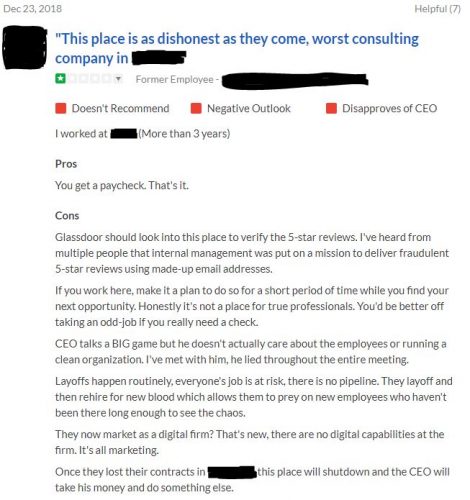Let’s say you are a leader in startup tech company. The company has big growth goals. To meet those goals, you’re going to need a lot of talented people.
The people you want are in high demand. They don’t struggle to find jobs. The competition for them is intense.
This is why you are sitting in a leadership team meeting talking about the company’s reputation. At this very moment, the group is discussing a particular review that recently popped up on Glassdoor.

So what’s it mean? Is it a one-star, one-off, disgruntled employee who you should ignore? Maybe.
This person is making some pretty heavy accusations. You could start by determining whether they are true. Are you pumping out fake 5-star reviews? Does the CEO regularly lie? Are you taking advantage of new employees? Is the company overstating its capabilities?
The person writing this review likely doesn’t know with certainty the answers. My guess is that the people sitting in your meeting do. Of course, it will take a brave soul who will say, “This person has a point.” Instead, someone will probably comment that haters gonna hate.
It’s easy to dismiss bad online reviews of your company, especially when most are pretty good. That doesn’t mean it’s a smart move.
These days I don’t spend one night in a hotel without at least scanning a handful of reviews. If there are a bunch of hotels to choose from, anything less than 4 stars will likely be eliminated from my consideration. And even hotels that do better than 4 stars can be quickly eliminated if I stumble upon one or two terrible reviews. Just seeing the word bedbugs once makes me look elsewhere.
Can you imagine any tech-savvy recruit not scanning online reviews of your company prior to talking with a recruiter about your position? I can’t.
There are times when I read an online review, and I conclude the person who wrote it wasn’t being fair. This usually happens because I mostly read, positive, detailed, credible sounding reviews for the company. The bad review sounds like an exception. Some people, after all, just are not a good fit. They had a bad experience. They wrote about it. End of story.
Most of the time, if you take a couple minutes to read at least 10 reviews, patterns start to emerge. Right or wrong, I form an impression of the company.
If you want the best talent, you need to make sure they will give your company as much consideration as you’ll give them. That means you need to make sure it’s a place where people want to work.
You can’t prevent all former-employees from trashing you online. You can; however, make an effort to continue building the kind of workplace that makes most employees want to rave about it to their friends and your future recruits.
Your starting point is in those reviews. Take the harshest ones you can find and have an honest conversation based on this question, “What are this person’s specific concerns and to what degree are they true?”
When you’re ready to do something about it, give us a call. We’d be happy to dig into the situation and help you build a pathway to improvement.



